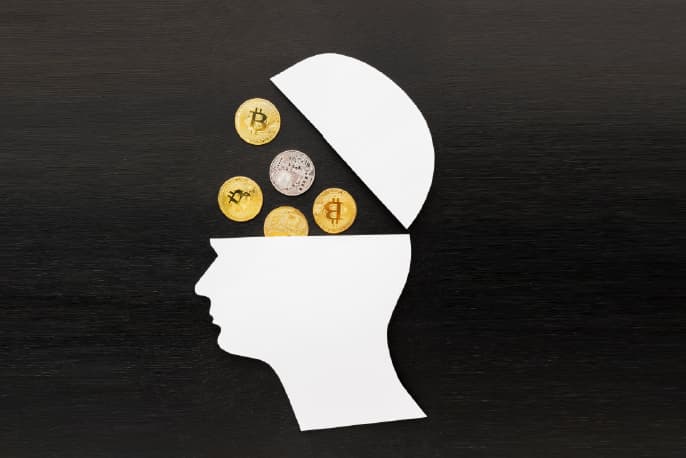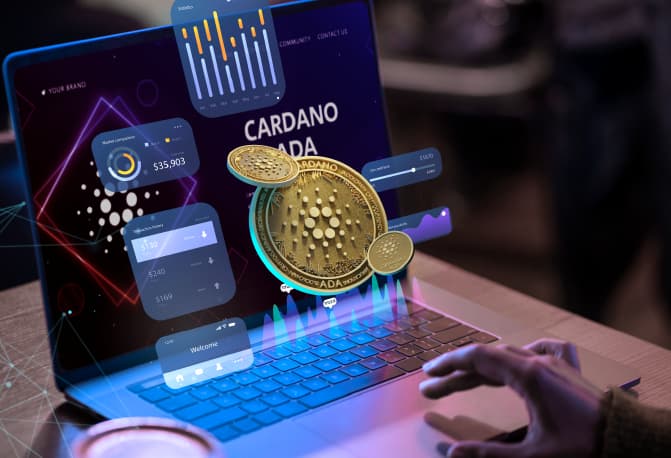As the world becomes increasingly digitized, the need for secure, decentralized platforms that can facilitate transactions and store data is more critical than ever. Enter blockchain technology. A blockchain is a distributed database that allows for secure, transparent, and tamper-proof transactions. This makes it ideal for applications in the financial sector and other industries where data security is a concern.
Furthermore, blockchain technology is often used with cryptocurrencies, digital currencies that use cryptography to secure their transactions. Blockchain and crypto provide a powerful tool for facilitating secure transactions and storing data.
In this beginner’s guide to blockchain technology, we’ll cover what a blockchain is, how it works, and some potential applications.
Table Of Contents:
What Is Blockchain Technology?
At its core, a blockchain is a distributed database. This means that instead of being stored on a single server or physical location, the data is spread out across a network of computers. This makes the data more secure and less vulnerable to hacks or data breaches.
Each computer in the network, called a node, stores a copy of the blockchain. This ensures that there is no single point of failure and that the data can be verified transparently.
Furthermore, all transactions on a blockchain are verified by the network before they are added to the blockchain. This verification process, called consensus, helps to ensure that the data on the blockchain is accurate and has not been tampered with.
Once a transaction is verified and added to the blockchain, it cannot be modified or deleted. This makes a blockchain an immutable record of transactions.
How Does a Blockchain Work?
Now that we’ve covered what a blockchain is, let’s take a closer look at how it works.
As we mentioned, a blockchain is a distributed database. This means that there is no central authority that controls the data. Instead, the data is stored across a network of computers called nodes.
Each node in the network stores a copy of the blockchain and verifies transactions. When a new transaction is made, it is broadcast to the network. The nodes then verify the transaction and add it to the blockchain.
The verification process is important because it helps to ensure that the data on the blockchain is accurate and has not been tampered with.
Once a transaction is verified and added to the blockchain, it cannot be modified or deleted. This makes the blockchain an immutable record of transactions.
Blockchain technology is often used with cryptocurrencies, digital currencies that use cryptography to secure transactions. Blockchain technology and crypto provide a powerful tool for facilitating secure transactions and storing data.
Cryptocurrency is often used as a means of payment or exchange on blockchain platforms. Bitcoin, Ethereum, and Litecoin are all examples of cryptocurrencies.
What Are the Benefits of Blockchain Technology?
Blockchain technology provides many potential benefits. Some of the most notable benefits include:
Security:
One of the main benefits of a blockchain is its security. Because a blockchain is a distributed database, it is more secure than a traditional centralized database. The data is spread out across the network and it is difficult to hack or tamper with.
Transparency:
Another benefit of a blockchain is its transparency. All transactions on the blockchain are public and can be verified transparently. This makes it difficult for anyone to commit fraud or tamper with the data.
Decentralization:
A blockchain is a decentralized technology, which means that there is no central authority. This makes it a democratic and open system.
What Are the Potential Applications of Blockchain Technology?
There are many potential applications of blockchain technology. Some of the most promising applications include:
Supply Chain Management:
A blockchain can be used to track the movement of goods throughout the supply chain. This would allow businesses to identify issues and disruptions quickly and efficiently.
Payments:
A blockchain can be used to facilitate secure and fast payments. This would reduce the need for intermediaries, such as banks, and could help to reduce costs.
Identity Management:
A blockchain can be used to store and manage identity data. This would be especially useful in countries where there is a lack of reliable identification systems.
Land Registration:
A blockchain can be used to store and manage land registration data. This would help to reduce fraud and corruption, and could make the process more efficient.
What Are the Risks of Blockchain Technology?
Despite its many potential benefits, blockchain technology also poses some risks. Some of the most notable risks include:
Scalability:
One of the main issues with blockchains is scalability. The network can only process a limited number of transactions per second, which may not be enough for some applications.
Energy Consumption:
Another issue with blockchains is energy consumption. The network requires a lot of energy to run, which could lead to environmental problems.
- They are often more accurate, allowing for the aggregation of many different opinions
- They are more efficient as they do not require intermediaries
- They are transparent, as all trades are recorded on the blockchain
Governance:
Another risk with blockchains is governance. Because there is no central authority, it can be difficult to make decisions or changes to the network.
How Can I Invest in Blockchain Technology?
If you’re interested in investing in blockchain technology, there are several ways to do so. You can invest in blockchain startups, buy cryptocurrency, or trade blockchain-based securities.
You can also use blockchain technology to create your own decentralized application (DAPP). This would allow you to experiment with the technology and potentially create a new way to do business.
Blockchain Technology Platforms:
Governmental Platforms:
Some governmental platforms where blockchain technology is being implemented are in Estonia, Dubai, and Switzerland. The most notable implementation is by the Estonian government, which offers digital identities to its citizens on the blockchain.
Commercial Platforms:
Some commercial platforms where blockchain technology is being implemented are at IBM, Microsoft, and JP Morgan.. The most notable implementation is by IBM, which offers a blockchain platform for businesses to develop and deploy applications on.
Social Media Platforms:
Some social media platforms where blockchain technology is implemented are Steemit and Akasha. The most notable implementation is by Steemit, a social media platform that rewards its users with cryptocurrency for posting and voting on content.
What Is the Future of Blockchain Technology?
The future of blockchain technology is very promising. The technology has the potential to revolutionize many industries and change the way we do business. However, there are still some challenges that need to be addressed, such as scalability and governance. If these issues can be resolved, then blockchain technology could truly transform the world.
What Is Cryptocurrency?
A cryptocurrency is a digital or virtual currency that uses cryptography to secure its transactions. Cryptocurrencies are decentralized, which means they are not subject to government or financial institution control. Bitcoin, the first and most well-known cryptocurrency, was created in 2009.
Types of Cryptocurrencies:
Bitcoin:
Bitcoin is the first and most well-known cryptocurrency. It is a peer-to-peer digital currency that allows for secure and anonymous transactions.
Ethereum:
Ethereum is a blockchain platform that allows for the development of decentralized applications. Ethereum also uses its cryptocurrency, called Ether.
Litecoin:
Litecoin is a cryptocurrency that is based on the Bitcoin protocol. It allows for faster and cheaper transactions than Bitcoin.
Dash:
Dash is a cryptocurrency that offers privacy features and speed not available with other cryptocurrencies.
Application of Blockchain Technology

Blockchain technology is used in various applications such as financial services, healthcare, supply chains, etc. The most notable application is in the financial services industry, where blockchain technology is used to streamline processes and reduce costs.
Lending and Borrowing Platforms
One of the most popular applications of blockchain technology is in the realm of lending and borrowing. Blockchain-based lending platforms allow users to lend or borrow cryptocurrency without the need for a central banking institution. This type of platform has a number of advantages over traditional lending platforms.
First, these platforms are often more accessible, as they do not require a credit check or other traditional verification forms.
Second, these platforms can offer better interest rates, as they are not subject to the same regulatory constraints as traditional banks.
Finally, these platforms are more transparent, as all transactions are recorded on the blockchain. This transparency can help to reduce the risk of fraud or default.
Overall, blockchain-based lending and borrowing platforms offer a number of advantages over traditional banking institutions.
Crowdfunding Platform
Crowdfunding platforms are another popular application of blockchain technology. These platforms allow individuals to solicit funds from the general public to finance a new project or business.
Crowdfunding platforms have a number of advantages over traditional methods of raising capital, such as loans or venture capital.
First, these platforms are more accessible as they do not require a high credit score or other forms of collateral.
Second, these platforms can be more efficient, as they allow individuals to raise money without giving up equity in their projects.
Finally, these platforms are more transparent, as all transactions are recorded on the blockchain.
Overall, blockchain-based crowdfunding platforms offer a number of advantages over traditional methods of raising capital.
Decentralized Exchange
A decentralized exchange is an exchange that does not rely on a central authority. Instead, these exchanges are run by code written into smart contracts.
Decentralized exchanges have a number of advantages over traditional centralized exchanges.
First, these exchanges are more resistant to censorship, as they do not rely on a single control point.
Second, these exchanges can offer better security, as they are not susceptible to hacking or theft.
Finally, these exchanges are more transparent, as all transactions are recorded on the blockchain.
Overall, decentralized exchanges offer a number of advantages over traditional centralized exchanges.
Prediction Market
A prediction market is a type of market that allows individuals to trade contracts based on the outcome of future events. Prediction markets can predict a wide range of events, ranging from sports matches to presidential elections.
Prediction markets have a number of advantages over traditional forms of gambling, such as casinos or sports betting.
First, these markets are more efficient, as they allow individuals to trade contracts without the need for a central authority.
Second, these markets can offer better odds as they are not subject to the same regulatory constraints as traditional gambling.
Finally, these markets are more transparent, as all transactions are recorded on the blockchain.
Overall, prediction markets offer a number of advantages over traditional forms of gambling.
DAO
A DAO is a decentralized autonomous organization. A DAO is an organization run by code written into smart contracts.
DAOs have a number of advantages over traditional organizations.
First, DAOs are more decentralized, as they do not rely on a central authority.
Second, DAOs can be more efficient as they are not subject to the same regulatory constraints as traditional organizations.
Finally, DAOs are more transparent, as all transactions are recorded on the blockchain.
Overall, DAOs offer a number of advantages over traditional organizations.
Identity Management
Identity management is the process of verifying and authenticating the identity of individuals. Identity management systems are used in various industries, ranging from banking to healthcare.
Identity management systems have a number of advantages over traditional methods of identity verification, such as driver’s licenses or passports.
First, these systems are more secure and based on cryptographic principles.
Second, these systems can be more efficient as they do not require the same infrastructure level as traditional identity verification methods.
Finally, these systems are more transparent, as all transactions are recorded on the blockchain.
Overall, identity management systems offer a number of advantages over traditional identity verification methods.
Tokenization
Tokenization is the process of converting assets into digital tokens. A wide range of assets can be tokenized, from fiat currencies to real estate.
Tokenization has a number of advantages over traditional methods of asset ownership, such as stocks or bonds.
First, tokens can be more easily divided and transferred, as they are not subject to the same restrictions as traditional assets.
Second, tokenized assets can be more efficiently traded as they do not require the same infrastructure level as traditional assets.
Finally, tokenized assets can be more transparent, as all transactions are recorded on the blockchain.
Overall, tokenization offers a number of advantages over traditional methods of asset ownership.
Blockchain Technology Usage

Blockchain technology was first introduced as the system that powers Bitcoin, the world’s first cryptocurrency. But since then, it has found applications in various other fields such as smart contracts, distributed ledgers, and so on. The use of blockchain technology with cryptocurrencies is significant because it helps to secure transactions by providing transparency and immutability.
When coupled with a cryptocurrency, a blockchain provides a decentralized way to store and manage transactions that are not controlled by any central authority. This makes it an attractive option for those looking for an alternative to traditional banking systems.
Moreover, blockchain-based transactions are fast and cheap, making them a viable option for day-to-day transactions. In conclusion, blockchain technology helps secure transactions and provide transparency for cryptocurrencies. It also helps make the process fast and cheap.
Record Keeping
The use of blockchain technology for record-keeping is one of the most significant applications of the technology. A blockchain can be used to store various records, such as medical records, financial records, and so on.
One of the key advantages of using a blockchain for record-keeping is transparency and immutability. This helps to ensure that the records are accurate and cannot be tampered with.
Business Management
Blockchain technology can also be used for business management purposes. For example, it can be used to manage a supply chain or keep track of the inventory.
Another advantage of using blockchain technology for business management is that it helps to reduce the cost and complexity of these processes. In addition, it also helps to improve the efficiency and transparency of these processes.
Thus, blockchain technology can be a valuable tool for businesses. It can help reduce the cost and complexity of business processes while also improving transparency and efficiency.
Financial Services
The financial sector is one of the earliest adopters of blockchain technology. A number of financial institutions are using blockchain technology to streamline their processes.
Some of the critical advantages that blockchain technology brings to the financial sector are transparency and immutability. This helps reduce the chances of fraud and improves trust among users.
In addition, blockchain technology can also help to reduce the cost and complexity of financial processes. It can also improve the speed and efficiency of these processes.
All in all, blockchain technology has the potential to revolutionize the financial sector. It can help improve transparency and trust among users while reducing the cost and complexity of financial processes.
The Benefits of Blockchain Technology Are Clear
It can help secure transactions, provide transparency, and reduce the cost and complexity of various processes. In addition, it is also likely to revolutionize the financial sector. So, it is no surprise that blockchain technology is gaining popularity among businesses and consumers alike.
Invest in cryptocurrency and check out the most valuable crypto offered by our platform!




































